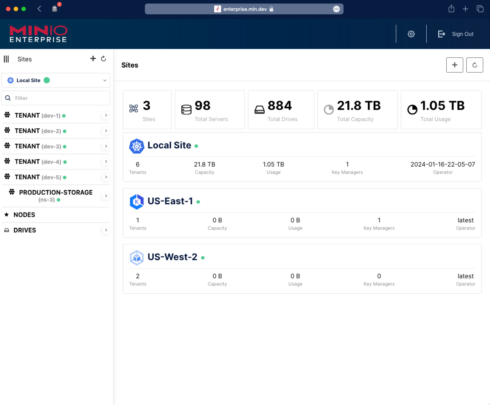
MinIO announced the MinIO Enterprise Object Store, a new product that enables the creation and management of exabyte-scale data infrastructure for commercial customers.
The MinIO Enterprise Object Store is expressly designed for the performance and scale challenges introduced by massive AI workloads. It’s available to new and existing MinIO customers and carries a commercial license.
The new offering consists of six main features. The first is Catalog, which enables operators to organize and search a large number of objects using the GraphQL interface.
Another new feature is Data Firewall, which is designed to protect the data layer even at billions of objects. It facilitates bucket and object-level rule creation, including TLS termination, load balancing, access control and QOS capabilities.
The MinIO Enterprise Key Management Server (KMS) is a specialized KMS designed for large-scale data infrastructures, addressing the unique challenges of managing billions of cryptographic keys and handling hundreds of thousands of cryptographic operations per second. It is built to be highly available, operationally straightforward, and fault-tolerant, with a strong focus on security. The server also supports multi-tenancy, allowing for the creation of isolated enclaves for each tenant, ensuring independence and security within the KMS cluster.
Other new features include Cache, Observability, and Enterprise Console. Additional details on the six solutions are available here.
“The data infrastructure demands for AI are requiring enterprises to architect their systems for 10s of exabytes while delivering consistently high-performance and operational simplicity,” said AB Perisamy, co-founder and CEO at MinIO. “The MinIO Enterprise Object Store adds significant value for our commercial customers and enables them to more easily address the challenges associated with billions of objects, hundreds of thousands of cryptographic operations per object per second or querying an exabyte scale namespace. The defining feature of AI workloads is extraordinary scale and delivering performance at that scale is beyond the capability of most existing applications.”








